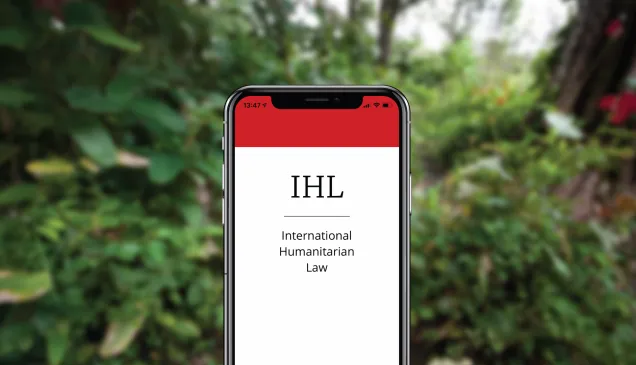Principles in action: How do neutrality and independence contribute to humanitarian effectiveness?
This side event of the 2015 UN Economic and Social Council (ECOSOC) Humanitarian Affairs Segment, co-organized by the ICRC and the International Federation, is part of the Research and debate cycle on principles guiding humanitarian action.
To watch the full conference, click here.
Welcoming remarks
- Mr Jean-Christophe Sandoz, Deputy Director of International Law and Policy, ICRC.
Chair
- Ms Joelle Tanguy, Under Secretary General, Humanitarian Values and Diplomacy, International Federation.
Panel
- His Excellency Mr Jorge Lomónaco, Ambassador Extraordinary and Plenipotentiary, Permanent Representative of Mexico to the United Nations
- Mr Georges Kettaneh, Secretary General of the Lebanese Red Cross
- Mr Antonio Donini, Senior Researcher at Tufts University
Summary of the conference
In his opening remarks, Jean-Christophe Sandoz emphasized that the principles of neutrality and independence, developed over more than a century and a half of humanitarian action, are crucial to gain acceptance and access to affected communities and allow the ICRC to work in places others cannot. Joelle Tanguy initiated the discussion by contextualising the debate: the year 2015 corresponds to the 50th anniversary of the Fundamental Principles of the International Red Cross and Red Crescent Movement (RCRC), and will culminate with the 32nd International RCRC Conference on 8-10 December. This landmark event will be followed by the World Humanitarian Summit in 2016. Hence questioning how we measure humanitarian effectiveness, and how neutrality and independence contribute to them, is both timely and pertinent.
Ambassador Lomónaco opened his remarks with a distinction between "effectiveness" and "efficiency": while humanitarian effectiveness means the ability to offer the best possible assistance and protection to people in conflicts and in disasters, humanitarian efficiency refers to the use of funds, reaching the right people, and delivering the aid when it is needed, all of which contribute to reducing the overall cost of the humanitarian response. In this sense, the use of an appropriate humanitarian architecture that can handle the current multiplicity of actors – both humanitarians and other responders such as states, militaries or private companies – is crucial. These different actors are not all equally bound by the principles and each have their own comparative advantage, depending on the circumstances in which they operate. For instance, the neutrality of humanitarian actors is crucial to develop trust and acceptance in situations of conflict, which in turn are necessary to gain access and deliver impartial aid.
Echoing the Ambassador of the Philippines, Mr. Lomónaco then submitted that while independence also remains an essential operational principle at all times, it may create challenges when operating in complex situations with a multiplicity of actors. Referring to natural disasters in particular, the Ambassador argued that principled action can make efficiency harder to achieve if a multiplicity of independent humanitarian actors requires an increased burden in terms of human and financial resources in order to be appropriately coordinated. The principles of neutrality and independence have a relevance that is relative to the context, and therefore require a nuanced application and understanding.
Georges Kettaneh explained how the complex confessional mosaic in Lebanon, and recurring tensions between communities, make acceptance and trust fundamentally important in order to ensure safe access to affected populations. Maintaining dialogue with the government, local authorities and non-state actors is critical to ensure that aid workers can cross checkpoints and evacuate civilians to hospitals. Maintaining this dialogue and trust is made possible by being seen as neutral and independent; being perceived as "principled actors" therefore contributes to humanitarian effectiveness as it allows the Lebanese Red Cross (LRC) to fulfil its humanitarian mission. Upholding these principles requires more than declarations of intent: the LRC actively strives to "walk its talk", notably through a careful recruitment of volunteers, for which specific policies have been developed. Though volunteers often come from affected communities themselves, they must be seen as neutral in their actions, which is why the recruitment and induction process can take between 9 – 12 months. This is to make sure that the volunteers are both able to act and be perceived as being neutral.
We do not read the Fundamental Principles: we practice those principles. (G.Kettaneh)
Kettaneh also insisted that for the LRC and the RCRC Movement in general, the Fundamental Principles are important both in peace and in wartime, for reasons of consistency. Indeed, you cannot be seen as partisan one day, and then try to appear neutral the next. Hence maintaining neutrality and independence is a continuous endeavour that requires perseverance. These two principles, being key to building trust and working in proximity to a population, enable humanitarian organizations to address needs in a relevant manner and to be accountable to populations, which is key to humanitarian effectiveness.
Accountability also means transparency: one community will always feel they are more vulnerable than another, which is why the priorities have to be discussed and explained in a transparent manner to all the affected parties. On the issue of accountability, Ambassador Lomónaco also added that international humanitarians need to consider their exit strategy and legacy, considering the adverse consequences that may occur after they leave. In that respect, neutrality and independence should not be construed as a blank check to evade this responsibility.
We know how to get in but we don't know how to get out without leaving certain legacy issues behind. (J. Lomónaco)
Bringing in the academic perspective, Antonio Donini underlined that there are different understandings of "humanitarian effectiveness" within the humanitarian sector: some focus on the effectiveness of the act itself (deontologists) while others focus more on longer-term consequences (consequentialists). This explains why the latter are tempted to conflate humanitarian action with e.g. human rights, justice, development, and peace-building. "These actors, who come to a situation with the objective with the intention of transforming the society" in which they operate, can contradict the principles of neutrality and independence – or be perceived as doing so. This situation leads to unintended consequences when one still claims to be "principled" despite having moved beyond the realm of neutral, impartial and independent humanitarian action. Invocation of the principles not matched by acts can fuel accusations of hypocrisy.
You have the principles like a bright light shining from the top of the hill, but reality is much more messy on the ground (A. Donini)
Indeed, parties to conflict do monitor how humanitarian organizations operate and work. Donini offered a concrete example of a rebel group he encountered in Afghanistan, one that makes an elaborate use of telecommunications technology to monitor where the funding of different NGOs comes from. These fighters tend to see organizations receiving the bulk of their money from belligerent states as lacking independence and neutrality. This is why there needs to be clarity on objectives and transparency regarding the rhetoric on the ground. This means not pretending you are principled if you are not. In a response to the audience, Donini emphasized that, far from belonging to the realm of the abstract, these principles are pragmatic tools that allow humanitarian organizations to navigate through the political complexities of conflict.
Conclusions and recommendations:
• Neutrality and independence are eminently pragmatic tools, which enable humanitarian actors to adapt to circumstances in an effective way.
• An appreciation that the application of neutrality and independence will be relative to the context is crucial to achieve effective action. They should not be applied in a dogmatic manner.
• Maintaining dialogue with all parties ensures humanitarian effectiveness, in that it builds trust and permits access to those in need, therefore enabling the humanitarian mission to be fulfilled.
• Neutrality and independence require consistency, perseverance and transparency. This is why these principles remain essential in all circumstances for RCRC Movement, including in peace time.
• Some actors claim to abide by the humanitarian principles (the "Dunantist" or "deontologist" approach), while also supporting a "consequentialist" approach which aims at transforming societies. These different approaches may be complementary, but the latter cannot be conflated with a Dunantist application of the humanitarian principles, as the political involvement it requires hampers neutral and independent action.
• Any lack of transparency or clarity about an agency's stance towards humanitarian principles can provoke unintended consequences, including problems of perceptions towards other actors on the ground. Humanitarians should be more open and aware when communicating what they are and what they are not.



